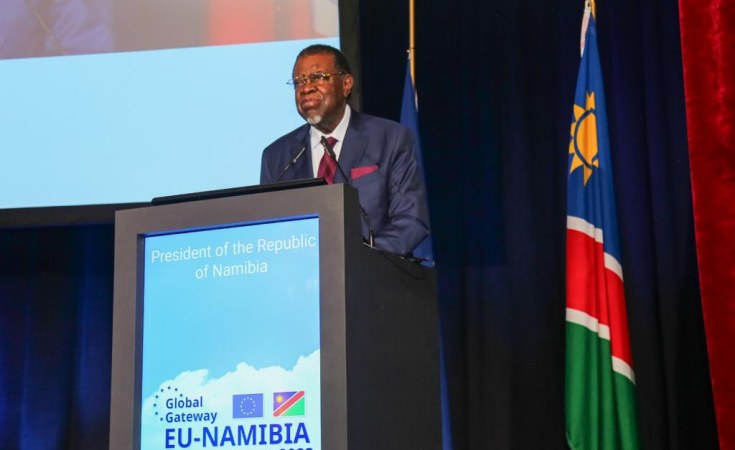President Hage Geingob yesterday told the world that Namibia will no longer export unprocessed mineral products.
Speaking at the European Union and Namibian Business Forum taking place in Belgium, Geingob's statement came after Cabinet decided to prohibit the exportation of Namibia's critical minerals in raw form. This is in a bid to create more local jobs, more local value and to boost domestic industrialisation efforts.
Namibia's economy is intricately linked to the extraction and processing of minerals for export, contributing significantly to its gross domestic product (GDP) and foreign exchange earnings.
This applies to minerals such as unprocessed crushed lithium, graphite, cobalt, manganese and rare earth elements.
Geingob was speaking at the opening of the first EU-Namibia business forum, taking place under the theme, 'Mobilising quality investment and value addition for green growth in the EU-Namibia partnership'.
The forum has a special focus on green hydrogen and sustainable critical raw materials value chains.
The business forum takes place in the margins of the first edition of the 2023 Global Gateway Forum that is underway in Brussels.
The EU is a political and economic alliance of 27 countries. It promotes democratic values in its member nations, and it is one of the world's most powerful trade blocs.
Critical resources
Geingob told the gathering that securing access to these critical resources is not just an economic endeavour, but also a strategic security imperative for the world's aspirations in delivering on green and clean energy objectives.
"As we embark on this journey, we recognise the importance of securing a sustainable supply of critical raw materials, such as lithium, cobalt and rare earth elements," he said.
The President added that Namibia is endowed with year-round sunlight, proximity to the Atlantic Ocean and abundant wind power resources.
These endowments, he noted, provide a strong foundation for Namibia to become an exporter of a diverse portfolio of clean energy products.
The production and export of renewable hydrogen and its derivatives, coupled with energy efficiency, electrification and direct use of renewable energy, are expected to offer Namibia an opportunity to achieve energy security.
It also provides a solid foundation upon which to establish new clean industries.
"Using Namibia's natural bounty of renewable energy and access to desalinated water to manufacture clean molecules, such as hydrogen and ammonia, is indeed a value additive economic activity that will result in systemic flows of foreign direct investment, significant gross fixed capital formation, impactful employment creation and a diversification of our exports to the EU and the world," said Geingob.
In addition, the President said, together with European partners, Namibia is dedicated to improving the sustainability of the extractive industry and developing local processing, refining, recovery and recycling capacity in Namibia.
The approach, he believes, has the potential to underpin sustainable, clean and inclusive economic growth, while also fostering domestic resource mobilisation, economic diversification and deeper linkages to the broader economy.
At the same occasion, Koen Doens, director general for international partnerships of the European Commission, said the business forum stems from a clear goal of expanding green hydrogen production capacity in Namibia, the development of downstream products and the local extractive refining and recycling industry for raw materials in Namibia.
To do so, the forum aims to attract European foreign direct investment (FDI) into Namibia and facilitate joint ventures.
"We are living in a fragmented and multipolar world, which is characterised by short-term shocks, such as the Covid-19 pandemic, and long-term shifts, such as climate change and demographic trends.
"In such a fragmented competitive world, it's essential to establish sustainable and equal partnerships to allow us to work together to address the most pressing challenges of our time. Namibia is a true ally when it comes to advancing the transition to a green and adjusted economy," Doens pointed out.
Strategic partnership
He added Namibia is the first country in Africa with which the EU has signed a strategic partnership. Since that signing, he noted the two parties have worked hand-in-hand to facilitate private and public investments to address challenges in doing business and to set the appropriate regulatory framework.
Also at the opening, Mekondjo Kaapanda-Girnus, Namibian ambassador to the EU, said the partnership will allow Namibia to seize new opportunities to strengthen economic cooperation, contribute towards international climate action -and at the same time promote sustainable development.
"We have a unique opportunity to address global and domestic challenges, for example, related to climate change, unemployment, inequality and poverty. We can create a model of international economic cooperation that strives to reconcile things that perhaps in the past were considered difficult to accommodate the challenge to reconcile people, the economy and the environment," said Kaapanda-Girnus.
Already an attraction
In Namibia, Andrada Mining is looking to exploit deposits of lithium and associated minerals that could well be more than 138 million tonnes.
Geingob also listed Broadmind Mining that has a maiden inferred resource of 570 million tonnes of light rare earths.
"These materials are essential for achieving our green and clean energy objectives, and they are in high demand across other industrial sectors - from aerospace to electronics and health. I am pleased to learn that the companies referred to earlier are in partnership with their EU counterparts, and they are willing to go one step further to add value to those minerals in Namibia - be it in the form of making battery precursors or permanent magnets," said the President.
During a plenary session at the forum, mines minister Tom Alweendo clarified that when Namibia talks about value addition on its raw materials, there is nothing like resource nationalism as inferred by some.
Resource nationalism is defined as the tendency of people and governments to assert control over natural resources located in their territory.


